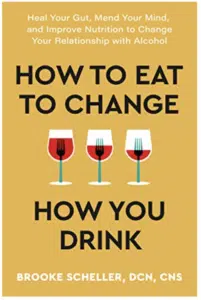Around the time of my early days in sobriety, I was invited to publish a chapter in a textbook on integrative approaches to substance use disorders. My chapter addressed the use of nutrition and supplements in the treatment of these disorders. As a Doctor of Clinical Nutrition with training in discovering and addressing the root causes of disease, it was my kind of assignment. I compiled all of the up-to-date literature on nutrition as it relates to recovery from alcohol use. I also started following sober accounts on social media to learn more about the alcohol-free world, something I was interested in both personally and professionally. The textbook chapter was published with a wealth of information, but what became evident to me was that there was a glaring gap in the discussions I saw out in the real world about nutrition in recovery, most of which excluded any mention of it at all. While many people were talking about the—also very important—tools for emotional recovery and abstinence from drinking, what was missing was a path for healing the damage that alcohol does to the physical body. This realization prompted me to dive into this world from a nutrition standpoint to strengthen my understanding of alcohol’s impact on key areas of the body and the ways nutrition could heal it.
As a former drinker myself, I remember regularly trying to exercise, supplement, and [insert wellness trend here] my way out of my heavy alcohol consumption. It wasn’t until I quit drinking and started digging into the research that I began to understand just how truly toxic and problematic alcohol is to our health. We are mostly taught that alcohol affects the brain and liver, but the truth is chronic alcohol use has a negative effect on most areas of the body including the digestive system, the gut, metabolism, heart health, and, yes, the brain and liver. To heal all of this damage, I developed an approach that eventually became my online program which I named Functional Sobriety. In the Functional Sobriety approach, we focus on three key areas of healing: gut, hormones, and brain. These three systems, if unbalanced—no matter what the cause—are often the drivers of multiple symptoms of chronic and acute illness.
Let’s briefly discuss each:
The gut
Alcohol consumption disrupts the balance of bacteria in the microbiome, which can contribute to digestive issues, skin concerns, immune, and autoimmune issues.
Hormones
Hormones including sex hormones, stress hormones, and blood sugar are all impacted by chronic alcohol intake.
The Brain
Alcohol affects both the structure and function of the brain. It also depletes many of the important vitamins and minerals—such as B vitamins, zinc, magnesium, and vitamin C—that help to support the natural production of neurotransmitters like serotonin and dopamine. Replenishment of these nutrients is key!
Proper nutrition is the key to supporting and rebalancing each of these systems. When looking at nutrition with the goal of supporting recovery and an alcohol-free lifestyle, there are two main things to consider: In early sobriety, nutrition can help manage cravings for sugar and alcohol and support a healthy brain, including balancing neurotransmitters like dopamine that are affected by alcohol. On a longer-term basis, foods and supplements can help restore health to the body after long-term alcohol use by healing the liver and the digestive system, balancing hormones, and replenishing important nutrients that may have been lost as a result of alcohol use.
The healing power of food is a powerful tool to support an alcohol-free lifestyle and a successful path in recovery. Making the choice to support these systems when planning your daily meals and snacks is a built-in opportunity each day to fuel, and heal, your body and mind through early recovery and well into the future.
Below we share Dr. Scheller’s top tips to help you integrate nutrition into your sober or sober-curious lifestyle, overcome sugar and alcohol cravings, and begin healing your body from long-term alcohol use.
How and what to eat to support recovery:
1. Consume protein with every meal and snack.2. Strategically time your meals to reduce alcohol cravings.3. Focus on healing the liver and the gut for optimum health.4. Consider supplements to help combat stress and anxiety.5. Eat for your brainFind Dr. Scheller's Book here:

How to Eat to Change How You Drink: Heal Your Gut, Mend Your Mind, and Improve Nutrition to Change Your Relationship with Alcohol
by Brooke Scheller
How to Eat to Change How You Drink is a revolutionary guide to leverage food and nutrition to reduce or eliminate alcohol consumption, develop mindfulness, and promote a healthier relationship with alcohol. Working through the book, readers will identify their drinking archetype and then learn the types of nutritional changes they can make to reduce alcohol cravings alongside behavior modification; they’ll learn how alcohol affects their nutritional status and can contribute to health symptoms ranging from fatigue, to hormonal imbalances, digestive irregularities, weight gain, thyroid disorders, autoimmune diseases and more; and they’ll restore their nutritional status and repair key body systems after moderate to heavy alcohol consumption.
This book will change the way we think about and address alcohol intake in our society– through the lens of nutrition. “




